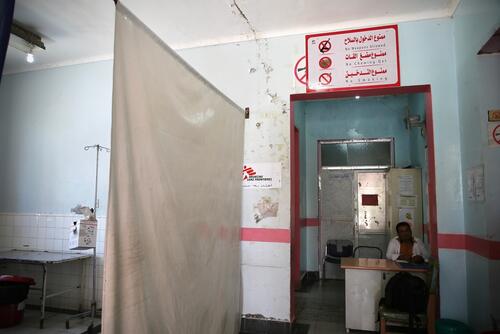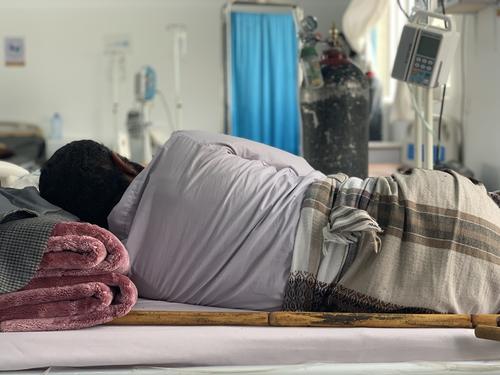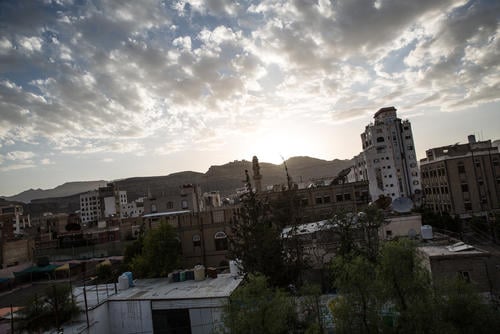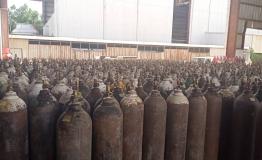- Medical staff and facilities supported by MSF in Taiz, Yemen, have come under repeated attack and armed incursions.
- The repeated incidents – including shelling – are hindering our ability to provide medical care to local people.
- MSF urges all warring parties to respect hospitals, healthcare staff and patients, and to end attacks.
Sana’a/Taiz, Yemen – Repeated attacks and armed violations against health facilities supported by Médecins Sans Frontières (MSF) in the city of Taiz, in war-torn southwestern Yemen, are compromising our ability to deliver effective medical care for Yemenis.
Between 2018 and 2020, MSF has recorded at least 40 incidents of violence against the MSF-supported Al-Thawra General hospital, its personnel and patients, including shootings inside or near hospital premises. Hospital buildings and structures were hit more than 15 times by small arms fire and shelling during this period, and there were nearly 10 incidents of medical staff being harassed and attacked.
MSF renews our call on all warring parties to take all necessary measures to respect health facilities and hospitals as humanitarian spaces, and to end indiscriminate attacks and other violations that threaten the lives of healthcare workers, patients and caretakers.
All parties involved in this conflict have a responsibility under International Humanitarian Law to ensure civilians and civilian infrastructure, including hospitals, are respected and protected.Corinne Benazech, MSF Operations Manager in Yemen
“Our humanitarian space is threatened by the repeated violations committed by the different warring parties in Taiz,” says Corinne Benazech, MSF Operations Manager in Yemen. “In Al-Thawra hospital, staff no longer feel safe in what should be a protected space, and patients avoid coming to the hospital, fearing for their lives, even when it is their only viable option for medical care.”
Al-Thawra General hospital is considered the largest public hospital in Taiz City. It has been struck by indiscriminate shelling from the armed forces of the Ansar Allah group and has suffered armed violations committed by armed groups linked to the internationally-recognised Government of Yemen.
Such attacks have also driven away medical staff from the hospital, as they look for ‘safer’ work elsewhere.
“As medical staff, your life is threatened at every moment in this hospital,” says HashemName changed to protect identity, a staff member at Al-Thawra hospital. “Most of the medical staff left after the many attacks that occurred. There is only one orthopaedic specialist left and two specialists in general surgery. The rest of the specialists are no longer here.”
As medical staff, your life is threatened at every moment in this hospital.Hashem*, medical staff member at Al-Thawra hospital
In a series of particularly shocking incidents, including one in October 2019 and another in January 2020, armed intruders killed patients receiving medical care inside the hospital. Such attacks led to the suspension of MSF’s activities on multiple occasions, and decisions by Al-Thawra management to shutdown hospital departments preventing people from accessing vital medical care.
Although the rate of aerial bombardment and artillery fire impacting medical facilities in Taiz fell in 2019, recent shelling that struck the hospital confirms that episodes of violence continue to be a major concern. Direct and indirect acts of violence against medical facilities not only endanger the lives of medical staff and patients, but also place additional barriers on an already constrained and fragile essential healthcare system.
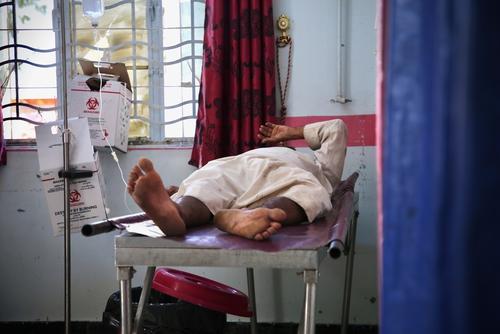
Earlier this month, fighting erupted across the eastern side of Taiz City and quickly spilled into the city, with shelling striking residential areas. On 13 March, Al-Thawra hospital’s emergency room received eight people who had been killed in the violence that day. The hospital itself was struck multiple times by shelling on the same day. Only a week earlier, on 5 March, a similar incident took place, when the hospital’s general laboratory was damaged and a medical staff member inside was wounded.
Armed groups outside the city must cease all indiscriminate firing into Taiz City, and armed groups inside the city must also, to a feasible extent, avoid locating military sites near densely populated areas. MSF has raised this issue with the relevant authorities but unfortunately our warnings have been ignored.
Every day, medical staff make courageous decisions to continue to provide healthcare despite the risks, for the benefit of Yemeni patients dependent on this care.Corinne Benazech, MSF Operations Manager in Yemen
“The actions of the warring parties clearly demonstrate a blatant disregard for the neutrality of hospitals and medical spaces,” says Benazech. “Every day, medical staff make courageous decisions to continue to provide healthcare despite the risks, for the benefit of Yemeni patients dependent on this care.”
“All parties involved in this conflict have a responsibility under International Humanitarian Law to ensure civilians and civilian infrastructure, including hospitals, are respected and protected,” says Benazech.
Since 2015, Taiz City, in south-west Yemen, has been engulfed in multiple frontlines that divided the city in two. The persistent active fighting has long impeded Yemenis’ access to basic services, particularly to essential healthcare.
By the end of 2015, MSF started supporting Al-Thawra Hospital in Taiz City, and quickly extended its support in 2016 to include two other key public hospitals, Al-Jumhouri and the Yemeni Swedish Hospital, to cover the health needs of the population.
Since 2015 and until the end of 2019, MSF-supported hospitals in Taiz City have treated 15,263 war-wounded, performed at least 3,400 surgeries, have seen 76,766 patients in the emergency room, assisted in more than 8,700 deliveries, and conducted more than 9,500 out-patient department consultations for paediatrics.



